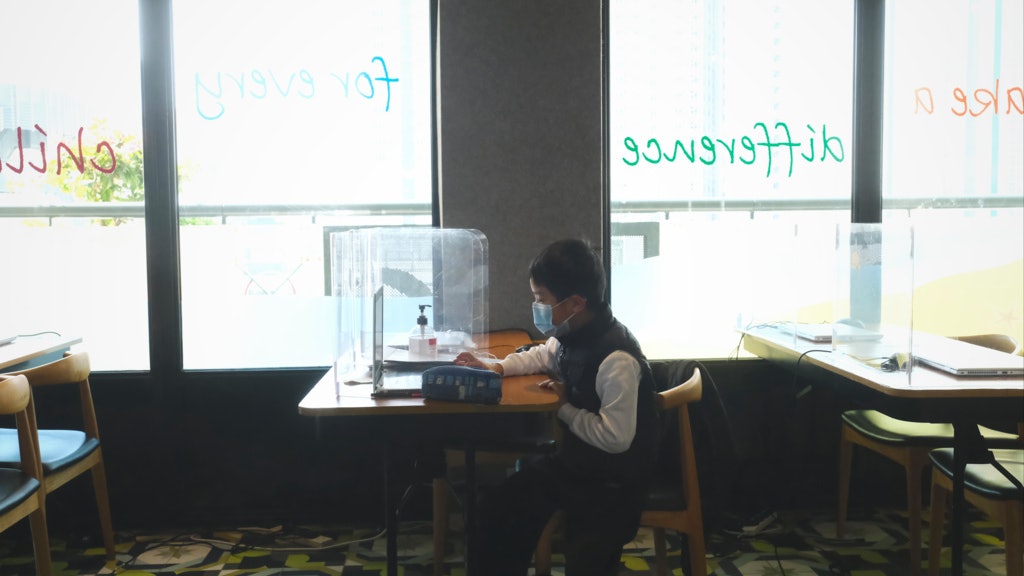Affected by the epidemic, students also have to accept the "new normal". In addition to switching to online classes, they also have to take the summer vacation earlier.
A survey found that before the fifth wave of the epidemic and during special holidays, more than 70% of students spent more than two hours a day on the Internet outside of their studies; 20% of students experienced serious emotional distress before and after the resumption of classes.
The Jordan Association of the Chinese YMCA of Hong Kong (hereinafter referred to as the YMCA) conducted a questionnaire survey in May this year, interviewing 1,184 primary 5 to secondary 3 students.
The survey found that before the fifth wave of the epidemic (i.e. from May to December last year), only 20.2% of the surveyed students spent more than six hours using the Internet, but during the special holiday period (i.e. from mid-March to mid-April this year) it rose to 20.2%. 26.7%.
Before and after the resumption of classes (i.e. from mid-April to mid-May this year), 20.7% and 14.7% of the surveyed students experienced severe and moderate emotional distress respectively.
After analysis, it was found that the mental health scores of the interviewed students were 20.4 points, 21.6 points and 24.6 points, respectively (the higher the score, the worse the mental health). It reflects that students who spend more time online have poorer mental health.
Nearly 90% of students are willing to spend time online in exchange for spending time with their families
The survey also found that nearly 90% of the students surveyed were willing to reduce their online leisure time during special holidays in exchange for spending time with their families, of which 63.7% were willing to reduce their leisure time by one hour or more.
Nearly 60% of the students said that if their parents had the conditions of tenderness, support, common topics, and humor, they would be more willing to reduce their leisure time online in exchange for getting along with their families.
Some five students said that during the epidemic, they spent more time playing video games online. Not only did they play excessively, but they were often distracted during online classes and watched video clips secretly, but later found that their desire to go back to school greatly increased. It’s getting more and more boring, and I really want to go back to school. I can meet my classmates in person, chat and play games together. Now I just want to go back to school every day!” She spent more time at home during the special vacation, but because her parents had to go to work, they got along with each other. Time has not increased, I hope parents can pay more attention.
Ma Qingmin suggested that parents should recognize that the Internet is not a tyrannical beast, but should be moderated.
(Provided by the Chinese YMCA of Hong Kong)
Long online classes make physical classes susceptible to social pressure
Shi Wenxin, the coordinating officer of the Jordan Club of the YMCA, said that in the past, young people and their classmates had deepened mutual understanding through daily face-to-face interactions, but in the past two years, most of the time has been online classes, and even new enrollment classes have been conducted online. There is not much contact and understanding among classmates. After returning to the physical class, it is inevitable to feel social pressure.
Ma Qingmin, assistant director-general of the counseling group of the YMCA and a psychological counselor, also pointed out that many foreign studies have shown that excessive use of social media is more likely to lead to negative emotions such as unhappiness, depression and jealousy. Most young people expect to escape from real life through the Internet stress, which, while temporarily avoiding stress, tends to worsen mood in the long run.
He emphasized that Internet access is not a tyrannical beast, but it should be done in moderation. If a child goes online too much, parents should not scold them blindly, but should be concerned about the reasons behind them.
The YMCA pointed out that when parents are concerned about their children's studies, they invite their children to do activities of common interest in their spare time, which helps to build a relationship of kinship and mutual trust, so that when children are under pressure, there are appropriate channels to ease their emotions, and they can trust that parents will have enough support. To support and support; also recommended to help young people set personal goals with a positive attitude; exercise to maintain physical and mental health; and maintain a proper social life.
Hong Kong University Research: Students' digital abilities improve with online classes, but their mental health and digital literacy are deteriorating Women living in subdivided housing found free iPads for their children to take online classes for their children. PolyU indicated that the rate of astigmatism among school children increased by 50%. Big

